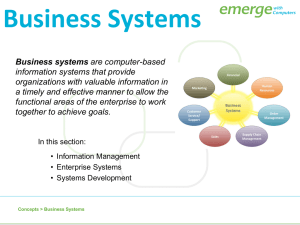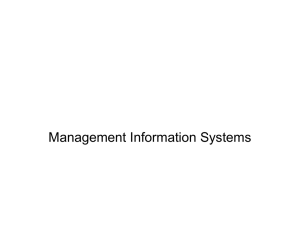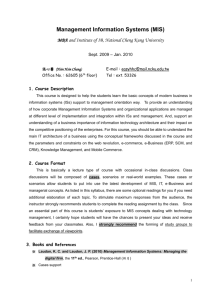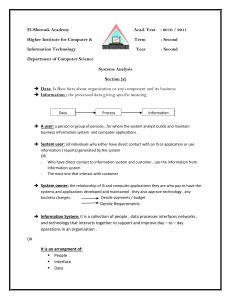Business Systems
advertisement
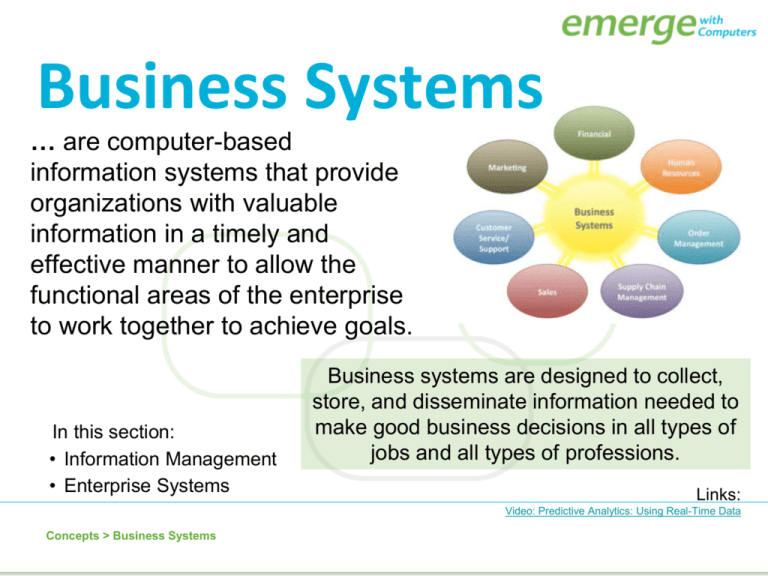
Business Systems … are computer-based information systems that provide organizations with valuable information in a timely and effective manner to allow the functional areas of the enterprise to work together to achieve goals. In this section: • Information Management • Enterprise Systems Business systems are designed to collect, store, and disseminate information needed to make good business decisions in all types of jobs and all types of professions. Links: Video: Predictive Analytics: Using Real-Time Data Concepts > Business Systems Information Management … refers to software and computerbased systems dedicated to collecting, storing, and manipulating data in a manner that produces useful information on which to base decisions. In this section: • Transaction Processing System • Management Information System • Decision Making • MIS Reports • • • • Business Intelligence Decision Support Systems Geographic Information System Informatics Links: Video: Business Analytics - Turning Data Into Insight Concepts > Business Systems > Information Management Transaction Processing System A transaction processing system (TPS) is an information system used to support and record transactions such as paying for products or paying an employee. Links: Video: iPad Cash Register from ShopKeep POS Concepts > Business Systems > Information Management > Transaction Processing System Management Information System A management information system or MIS provides routine business information to decision makers in a useful and convenient format. Links: Video: Concordia MIS Student Success Concepts > Business Systems > Information Management > Management Information System Decision Making Decision making is the key component of the problem-solving process that takes place in three stages: intelligence, design, and choice. Problem-Solving Approach Problem Type Problem-Solving Method Links: Video: Invalid Link - needs fixed! Concepts > Business Systems > Information Management > Decision Making MIS Reports MIS reports present useful information for management, often compiled by querying a database. Links: Video: IBM Cognos Express Concepts > Business Systems > Information Management > MIS Reports Business Intelligence Business intelligence (BI) refers to technologies that are used to gather and report information that supports intelligent business decision making. BI has become a buzzword in business because of its ability to propel a company forward. Links: Video: A SAS Overview - Proven Concepts > Business Systems > Information Management > Business Intelligence Decision Support System The DSS approach realizes that people, not machines, make decisions. A decision support system (DSS) is an information system used to support problem-specific decision making. Links: Video: Why Data Matters: Context Reveals Ansers Concepts > Business Systems > Information Management > Decision Support System Geographic Information System A geographic information system (GIS) captures, manages, analyzes, and displays geographically referenced information, often utilizing maps with overlaid data. GISs are particularly useful to professionals, such as urban planners, social workers, law enforcement personnel, sociologists, geologists, meteorologists, civil engineers, and those who work in government agencies. Links: Video: GIS Concepts > Business Systems > Information Management > Geographic Information System Informatics Informatics applies computer-based information system technologies to support traditional disciplines such as science and medicine. Links: Video: The Epocrates iOS user experience Concepts > Business Systems > Information Management > Informatics Information Management Terms • Business Systems • Information Management • Transaction Processing System (TPS) • Transaction • Batch Processing • Real-Time Transaction Processing • Transaction Processing Cycle • Order Processing System • Purchasing System • Management Information System (MIS) • Decision Making • Reactive Problem Solving • Proactive Problem Solving • Programmed Decisions • Structured Problems • Nonprogrammed Decisions • Unstructured Problems • Optimization Model • Heuristics • MIS Reports • Scheduled Reports • Key-Indicator Report • • • • • • • • • • • • Demand Reports Exception Reports Business Intelligence (BI) Key Performance Indicators (KPIs) Executive Dashboard Decision Support System (DSS) What-If Analysis Goal-Seeking Analysis Geographic Information System (GIS) Informatics Bioinformatics Medical Informatics Concepts > Business Systems > Information Management > See your eBook for more information about these terms Enterprise Systems … are information systems designed to support the functions of an enterprise, as well as the integration of such systems into enterprise resource planning systems. In this section: • Knowledge Management • Customer Relationship Management • Systems Development • Enterprise Resource Planning • Project Management Concepts > Business Systems > Enterprise Systems Knowledge Management A knowledge management (KM) system assists an organization in capturing, storing, and distributing knowledge for use and reuse by the organization and, sometimes, its partners and customers. Knowledge is much more valuable to the world when it is shared. Knowledge management systems allow people to share and disperse their knowledge. Links: Video: Discover What You Know Concepts > Business Systems > Enterprise Systems > Knowledge Management Customer Relationship Management Customer relationship management (CRM) refers to the use of information systems to store detailed information on prospective, current, and past customers to improve customer service and support targeted marketing. Links: Video: Microsoft CRM 3.0: Lemonade Stand Concepts > Business Systems > Enterprise Systems > Customer Relationship Management Enterprise Resource Planning An enterprise resource planning (ERP) system integrates all data processing in a corporation (enterprise) into one unified system that draws from a central database system to streamline the flow of information throughout an enterprise and provide greater efficiencies and savings. Links: Video: LG Electronics Builds Global ERP Concepts > Business Systems > Enterprise Systems > Enterprise Resource Planning Systems Development Systems development … is the activity of creating new or modifying existing information systems. Everyone who interacts with software and information systems should be involved with the process of systems development so that new systems are effective and efficient. Concepts > Business Systems > Enterprise Systems > Systems Development Project Management Project management is the process of planning, monitoring, and controlling the sequence of events and resources required in a project, often using software tools. Studies show that college students graduating with project management skills find better-paying jobs more easily than those without such skills. Links: Video: Microsoft Project 2010: Creating a Task List Concepts > Business Systems > Enterprise Systems > Project Management Enterprise Systems Terms • • • • • • • • • Enterprise Systems Enterprise Knowledge Management (KM) Knowledge Worker Customer Relationship Management (CRM) Enterprise Resource Planning (ERP) Supply Chain Management (SCM) Systems Development Systems Development Life Cycle (SDLC) • • • • Systems Analyst Project Management PERT Gantt Chart Concepts > Business Systems > Enterprise Systems > See your eBook for more information about these terms
